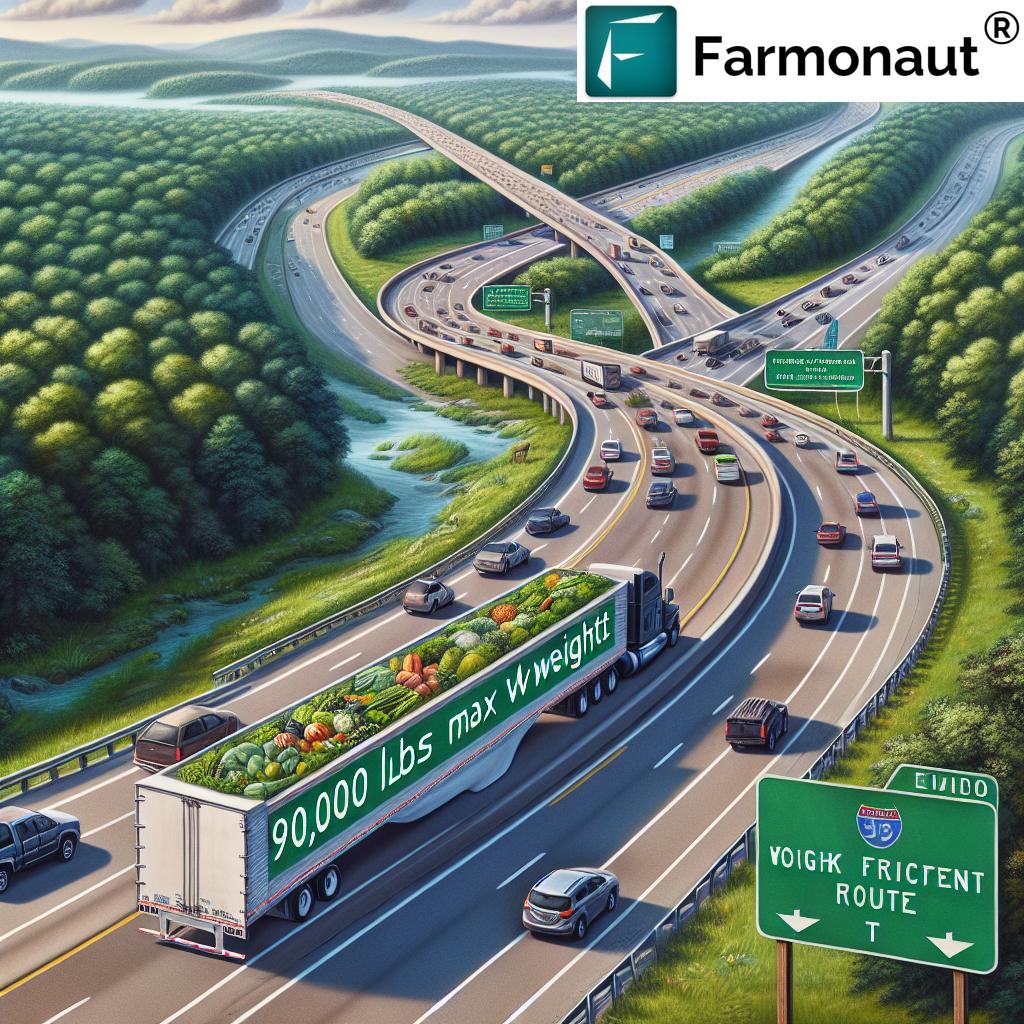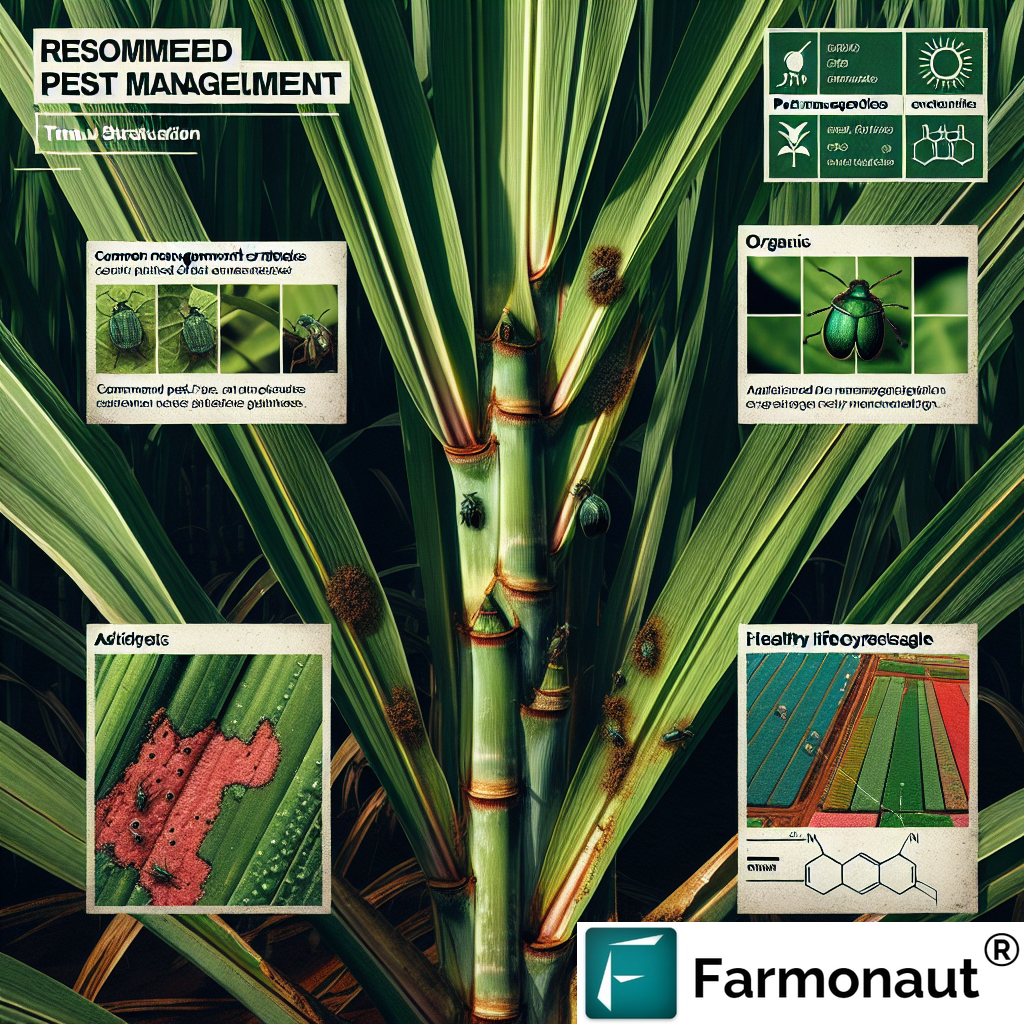Virginia’s Interstate Weight Limits: Boosting Agricultural and Logging Efficiency on Rural Roads
“Virginia’s new proposal aims to increase interstate weight limits for agricultural trucks to 90,000 pounds, matching state road limits.”
In a significant move aimed at revolutionizing the transportation landscape for Virginia’s agricultural and logging industries, we are witnessing a pivotal moment in the state’s approach to interstate weight limits and agricultural truck regulations. The proposed “Agriculture and Forestry Hauling Efficiency Act” is set to reshape how farmers and loggers move their products across the Commonwealth, potentially ushering in a new era of efficiency and safety on our roads.

As we delve into the intricacies of this groundbreaking legislation, it’s crucial to understand its far-reaching implications for Virginia’s rural communities, highway infrastructure, and the vital industries that form the backbone of our state’s economy. Let’s explore how this act could transform the way we think about agricultural transportation and logging efficiency in Virginia.
The Current Landscape of Virginia’s Transportation Regulations
Before we dive into the proposed changes, it’s essential to understand the current regulatory environment governing weight limits on Virginia’s roads:
- Interstate Highways: Currently, trucks carrying unprocessed agricultural and forestry products are limited to lower weight capacities on interstate highways compared to state roads.
- State Roads: These roads allow for higher weight limits, up to 90,000 pounds for certain agricultural and logging vehicles.
- Rural Roads: Many trucks are forced to use these routes due to interstate weight restrictions, leading to increased traffic and safety concerns in rural areas.
This disparity between interstate and state road regulations has long been a point of contention for Virginia’s agricultural and logging industries. It has led to inefficiencies in transportation, increased fuel consumption, and potential safety hazards on rural roads not designed for heavy truck traffic.
The Proposed Agriculture and Forestry Hauling Efficiency Act
Republican Virginia Rep. John McGuire has introduced a game-changing bill in Congress that could significantly alter the transportation landscape for Virginia’s agriculture and logging sectors. The key provisions of this act include:
- Increasing the maximum allowable weight for trucks carrying unprocessed agricultural and forestry products on Virginia’s interstate highways to 90,000 pounds.
- Aligning interstate weight limits with existing state road limits, creating uniformity across Virginia’s road network.
- Focusing on enhancing safety by reducing the number of heavy trucks forced onto rural and secondary roads.
- Aiming to improve overall transportation efficiency and reduce costs for farmers and loggers.
This proposal has garnered support from various industry groups, including the Virginia Farm Bureau, the Virginia Loggers Association, and the American Loggers Council. These organizations see the potential for significant improvements in both safety and efficiency.
Comparative Analysis of Virginia’s Interstate Weight Limits
| Category | Current Limit | Proposed Limit |
|---|---|---|
| Interstate Highway Weight Limit | 80,000 pounds | 90,000 pounds |
| State Road Weight Limit | 90,000 pounds | 90,000 pounds (unchanged) |
| Unprocessed Agricultural Products | Limited on interstates | Allowed up to 90,000 pounds on interstates |
| Raw Forest Materials | Limited on interstates | Allowed up to 90,000 pounds on interstates |
| Annual Fuel Savings | N/A | Estimated 15-20% reduction |
| Projected Reduction in Rural Road Traffic | N/A | Estimated 30-40% decrease |
| Estimated Decrease in Accidents | N/A | Projected 10-15% reduction |
This table clearly illustrates the potential impact of the proposed legislation on Virginia’s transportation landscape. By aligning interstate weight limits with those already permitted on state roads, we can anticipate significant improvements in efficiency and safety across the Commonwealth.
The Impact on Virginia’s Agricultural Sector
The agricultural industry stands to benefit significantly from these proposed changes. Here’s how:
- Increased Hauling Efficiency: Farmers will be able to transport larger loads of unprocessed agricultural products on interstate highways, reducing the number of trips required.
- Cost Savings: With fewer trips and more direct routes available, farmers can expect reductions in fuel consumption, vehicle wear and tear, and overall transportation costs.
- Improved Market Access: The ability to use interstate highways more effectively could open up new markets for Virginia’s agricultural products, potentially increasing profitability for farmers.
- Enhanced Safety: By reducing the number of agricultural trucks on rural roads, we can expect a decrease in accidents and improved safety for both truck drivers and the general public.
Scott Sink, CEO of the Virginia Farm Bureau, emphasizes the positive impact this legislation could have: “Increasing weight limits will make for greater efficiency, reduced truck traffic on rural roads and alleviate hauling shortages.”

Transforming Virginia’s Logging Industry
The logging sector is another key beneficiary of the proposed changes. Here’s how the industry could be transformed:
- Streamlined Operations: Loggers will be able to transport heavier loads of logs and rough-sawn lumber on interstate highways, improving operational efficiency.
- Reduced Environmental Impact: With fewer trips required to transport the same amount of raw forest materials, we can expect a reduction in emissions and overall environmental impact.
- Improved Competitiveness: The ability to transport larger loads more efficiently could enhance the competitiveness of Virginia’s logging industry in national and international markets.
- Safety Enhancements: By allowing logging trucks to use interstate highways more frequently, we can reduce the strain on rural roads and potentially decrease accidents in areas with limited visibility or challenging terrain.
Ron Jenkins, executive director of the Virginia Loggers Association, highlights the safety benefits: “Keeping our commercial trucks off the available interstates leads to more accidents and fatalities. This legislation is much needed and will improve highway safety for truck drivers and the public.”
“The proposed legislation could reduce traffic on rural roads and address hauling shortages in Virginia’s agricultural sector.”
Environmental and Economic Considerations
While the primary focus of this legislation is on improving efficiency and safety, there are also significant environmental and economic factors to consider:
- Reduced Fuel Consumption: By allowing heavier loads on interstate highways, we can expect a decrease in overall fuel consumption for the agricultural and logging industries.
- Lower Emissions: Fewer trips and more efficient routing could lead to a reduction in greenhouse gas emissions from transportation in these sectors.
- Economic Growth: Improved transportation efficiency could lead to increased productivity and potentially stimulate economic growth in Virginia’s rural communities.
- Infrastructure Considerations: While the legislation aims to improve efficiency, it’s crucial to consider the potential impact on interstate highway infrastructure and ensure proper maintenance planning.
These environmental and economic benefits align well with broader sustainability goals and could position Virginia as a leader in efficient and environmentally conscious agricultural and forestry transportation.
The Role of Technology in Optimizing Transportation
As we consider these changes to Virginia’s interstate weight limits, it’s important to recognize the role that technology can play in further optimizing transportation efficiency. Advanced solutions like those offered by Farmonaut can provide valuable tools for farmers and loggers to enhance their operations:
- Satellite-Based Crop Monitoring: Farmonaut’s satellite technology allows farmers to monitor crop health remotely, potentially reducing the need for frequent physical inspections and optimizing harvesting schedules.
- AI-Driven Advisories: With Farmonaut’s Jeevn AI system, farmers can receive personalized recommendations that could help them plan their transportation needs more effectively.
- Fleet Management Tools: Farmonaut’s fleet management solutions could help agricultural and logging businesses optimize their vehicle usage, complementing the benefits of the new weight limit regulations.
By combining legislative changes with technological advancements, Virginia’s agricultural and logging industries can achieve even greater efficiencies and sustainability in their operations.
Addressing Concerns and Ensuring Safety
While the proposed legislation offers numerous benefits, it’s crucial to address potential concerns and ensure that safety remains a top priority:
- Road Infrastructure: We must consider the impact of heavier loads on interstate highways and ensure that our infrastructure can support these changes safely.
- Driver Training: With the potential for increased interstate travel, additional training for drivers handling heavier loads may be necessary to maintain safety standards.
- Monitoring and Enforcement: Robust systems for monitoring compliance with the new weight limits and enforcing regulations will be essential to prevent misuse and ensure safety.
- Public Awareness: Educating the public about the changes and their potential impact on interstate traffic patterns will be crucial for maintaining road safety for all users.
By proactively addressing these concerns, we can help ensure that the benefits of the new legislation are realized while minimizing potential risks.
The Broader Impact on Virginia’s Economy
The proposed changes to interstate weight limits have the potential to create ripple effects throughout Virginia’s economy:
- Increased Competitiveness: More efficient transportation could make Virginia’s agricultural and forestry products more competitive in national and international markets.
- Job Creation: Improved efficiency and potential market expansion could lead to job growth in related sectors, such as processing and distribution.
- Rural Economic Development: By reducing transportation costs and improving market access, this legislation could provide a significant boost to rural economies across the Commonwealth.
- Innovation Stimulus: The changes may spur innovation in vehicle design and logistics management to take full advantage of the new weight limits.
These economic benefits could help strengthen Virginia’s position as a leader in agricultural and forestry production while supporting the state’s overall economic growth.
Looking to the Future: Potential Long-Term Impacts
As we consider the implementation of this legislation, it’s important to look ahead and anticipate potential long-term impacts:
- Shift in Transportation Patterns: We may see a significant shift in how agricultural and forestry products are transported across the state, with greater utilization of interstate highways.
- Infrastructure Investment: The changes could necessitate increased investment in highway infrastructure to support heavier loads over time.
- Technological Advancements: The new regulations may drive further technological innovations in vehicle design, load management, and transportation logistics.
- Policy Evolution: This legislation could serve as a model for other states, potentially leading to broader changes in interstate transportation regulations across the country.
By anticipating these long-term impacts, Virginia can position itself at the forefront of efficient and sustainable transportation practices in the agricultural and logging sectors.
Conclusion: A New Era for Virginia’s Agricultural and Logging Transportation
The proposed “Agriculture and Forestry Hauling Efficiency Act” represents a significant step forward in addressing the unique transportation needs of Virginia’s agricultural and logging industries. By aligning interstate weight limits with those already permitted on state roads, this legislation has the potential to:
- Enhance safety on rural roads by reducing heavy truck traffic
- Improve transportation efficiency for farmers and loggers
- Reduce fuel consumption and emissions
- Stimulate economic growth in rural communities
- Position Virginia as a leader in innovative transportation solutions
As we move forward with this initiative, it will be crucial to carefully monitor its implementation, address any challenges that arise, and continue to seek ways to optimize our transportation infrastructure for the benefit of all Virginians.
The future of Virginia’s agricultural and logging transportation looks brighter with these proposed changes. By embracing efficiency, prioritizing safety, and leveraging technology, we can ensure that these vital industries continue to thrive and contribute to the Commonwealth’s prosperity for generations to come.
FAQs
- What is the main goal of the Agriculture and Forestry Hauling Efficiency Act?
The main goal is to increase the maximum allowable weight for trucks carrying unprocessed agricultural and forestry products on Virginia’s interstate highways to 90,000 pounds, aligning with existing state road limits. - How will this legislation improve safety on rural roads?
By allowing heavier loads on interstate highways, the legislation aims to reduce the number of trucks forced to use rural and secondary roads, potentially decreasing accidents and improving overall road safety. - What are the potential economic benefits of this act?
The act could lead to reduced transportation costs, improved efficiency, and potentially stimulate economic growth in rural communities by making Virginia’s agricultural and forestry products more competitive. - How will this legislation impact the environment?
By allowing for more efficient transportation, the act could lead to reduced fuel consumption and lower emissions from fewer trips required to transport the same amount of goods. - Are there any concerns about the impact on interstate highway infrastructure?
Yes, there are considerations about the potential impact of heavier loads on interstate highways. Proper maintenance planning and monitoring will be crucial to address these concerns.




















